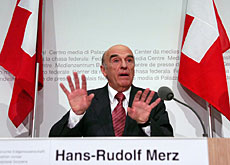EU fails to agree on tax negotiating mandate

EU experts have been unable to reach consensus on a European Commission mandate to put pressure on Switzerland to change its tax practices.
The Commission believes the generous Swiss tax breaks given to holding companies amount to illegal state aid and are in violation of bilateral agreements.
EU member states met in Brussels on Tuesday to discuss for the first time a negotiating mandate in the tax dispute, but the so-called Efta Group failed to reach an agreement.
The Efta Group consists of experts from EU states who deal with relations between Brussels and the four non-member nations belonging to the European Free Trade Association (Efta): Switzerland, Iceland, Liechtenstein and Norway.
Sixteen delegations participated in the discussions – “and not one criticised the commission’s unanimous decision on February 13”, according to one diplomat on Tuesday.
On that date the EU called on Switzerland to amend tax rules that it said offered unfair advantages to firms operating in some Swiss cantons.
The Commission said low corporate taxes offered by cantons such as Obwalden and Zug violated a 1972 trade agreement, calling it a disguised state subsidy.
Many EU countries are angry that tax revenues are being lost as companies relocate to Switzerland – mainly to small cantons offering low levies.
The Swiss authorities defended themselves, calling the decision unfounded. The finance ministry said no contractual regulations existed between Switzerland and the European Union on the harmonisation of company taxation.
It added that neither the EU rules on competition, including those on state aid, nor the EU member states’ code of conduct on company taxation were applicable to Switzerland.
Exploratory talks
The Commission said on Tuesday it had received “great support” from member states but acknowledged that real negotiations with Bern were unlikely to happen before Swiss federal elections at the end of the year.
It added that it wanted exploratory talks to take place as soon as possible.
But one delegate said in Brussels that it wasn’t out of the question for the outstanding issues to be cleared up at the next Efta Group meeting on March 13.
If the diplomats do manage to agree – or reach a sufficiently large majority – on a position regarding Switzerland’s cantonal tax privileges, the agreement of the European Council of Ministers would be a formality.
Drastic step
It is unlikely however that the negotiating mandate would fail because of resistance from single EU states.
The governments of Austria and Luxembourg for example have previously expressed sympathy for the Swiss position in the tax dispute, but this does not mean that they are against negotiations.
This was reflected in comments made on Tuesday at a council of finance ministers, also in Brussels.
“It is absolutely no problem for Luxembourg if negotiations take place with Switzerland,” said Luxembourg Prime Minister Jean-Claude Juncker. “But the discussions should not be accompanied by threats.”
Austrian Finance Minister Wilhelm Molterer repeated what he had told Swiss Economics Minister Doris Leuthard in Vienna on Monday: “We would both do well to keep an eye on things so that a serious conflict doesn’t arise from this issue.”
Behind the scenes in Brussels it is hoped that the Swiss government will be ready to negotiate once the federal elections are out of the way. If not, the EU will propose punitive tax duties.
It remains to be seen whether the 27 EU states will agree to such a drastic step with the necessary majority.
swissinfo, based on a German article by Simon Thönen in Brussels

More
EU bilateral accords
Selected cantonal corporate tax rates (federal, cantonal and municipal) from a KPMG report published in November 2006: Obwalden 13.1% of operating income, Schwyz 15.6%, Zug 16.4%, Zurich 21.3%, Graubünden 29.1%. Swiss average 21.3%.
Business tax rates in other countries: Japan 40.7%, US 40%, Germany 38.3%, Republic of Ireland 12.5%, Cyprus 10%.
Switzerland is convinced that the procedures for taxing management companies, mixed companies and holding companies in the country do not fall within the scope of the 1972 free trade agreement.
The 1972 accord exclusively governs the trading of certain goods (industrial and agricultural processed products).
Bern says when signing the accord, neither Switzerland nor the European Economic Community intended to harmonise their laws either with regard to goods or in the areas of competition or state subsidies.
It argues that the provisions of the accord are not to be interpreted in the same manner as the EEC treaty’s more detailed rules on competition.

In compliance with the JTI standards
More: SWI swissinfo.ch certified by the Journalism Trust Initiative













You can find an overview of ongoing debates with our journalists here . Please join us!
If you want to start a conversation about a topic raised in this article or want to report factual errors, email us at english@swissinfo.ch.